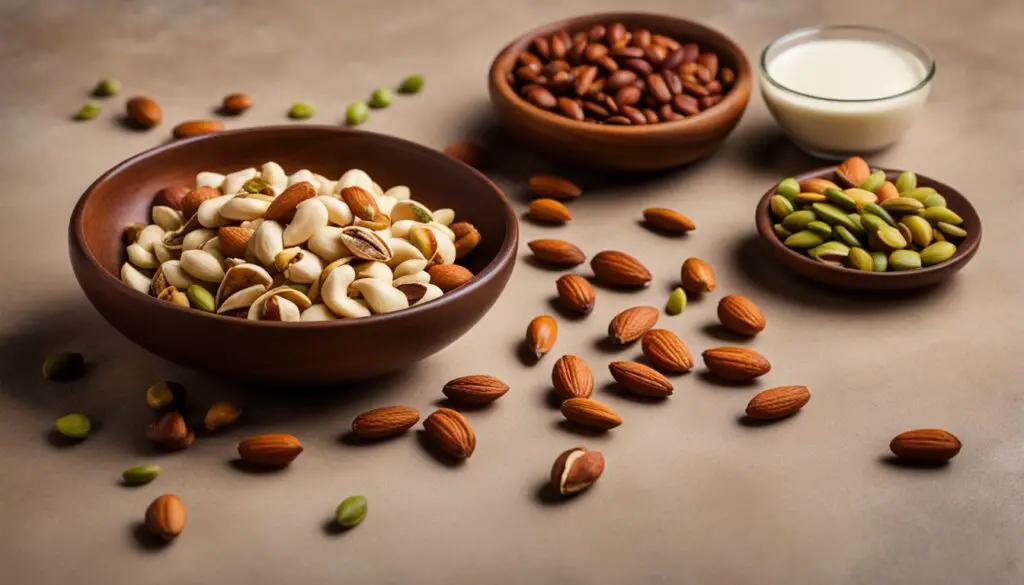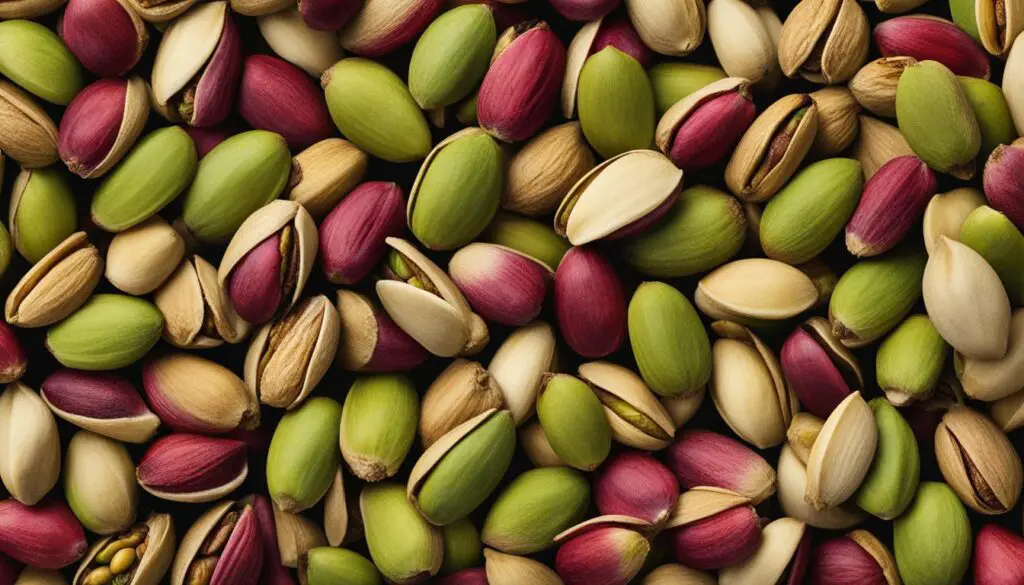Pistachios, scientifically known as Pistacia vera, are a tree nut in the Anacardiaceae family. They are enriched with various health-benefiting nutrients. Pistachios are believed to have originated in West Asia and Turkey and are now cultivated on a larger scale in countries such as the US, Iran, Syria, Turkey, and China. The most popular variety is the Kerman cultivar from Iran. When it comes to the zinc content in pistachios, they are considered to be a good source.
Key Takeaways:
- Pistachios are a good source of zinc.
- They are enriched with various health-benefiting nutrients.
- Pistachios originated in West Asia and Turkey.
- The Kerman cultivar from Iran is the most popular variety.
- Including pistachios in your diet can contribute to your overall zinc intake.
Pistachio Nutrition Facts
Pistachios are a delicious and nutritious snack that offers a wide range of health benefits. These nutty and sweet treats with a fruity aroma can be enjoyed in various ways – eaten as they are, roasted, salted, or even sweetened. Along with their delightful taste, pistachios are packed with essential nutrients that support overall well-being.
When it comes to pistachio nutrition facts, these nuts are a great source of protein, dietary fiber, and healthy fats. They are also loaded with vitamins and minerals that are vital for maintaining good health. Let’s take a closer look at the nutritional value of pistachios:
| Nutrient | Amount per 100g |
|---|---|
| Protein | 20g |
| Dietary Fiber | 10g |
| Fat | 45g |
| Vitamin B6 | 1.7mg |
| Iron | 3.9mg |
| Magnesium | 120mg |
Source: NutritionValue.org
In addition to these essential nutrients, pistachios are also rich in antioxidants such as resveratrol and flavonoids. These antioxidants play a crucial role in protecting the body against free radicals and reducing the risk of chronic diseases.
The combination of protein, fiber, and healthy fats in pistachios helps promote satiety and keeps you feeling fuller for longer. This can aid in weight management and contribute to a balanced diet.
The health benefits of pistachios go beyond their nutritional value. They have been linked to various positive outcomes, including:
- Improved heart health and reduced risk of cardiovascular diseases.
- Lower cholesterol levels due to the presence of heart-healthy fats.
- Support for blood sugar management and lower risk of type 2 diabetes.
- Promotion of gut health and improved digestion.
- Anti-inflammatory properties that help reduce inflammation in the body.
- Enhanced eye health and reduced risk of age-related macular degeneration.
To fully appreciate the health benefits of pistachios, aim to incorporate them into your diet regularly. Whether as a standalone snack or as an ingredient in various dishes, pistachios can add a burst of flavor and nutrition to your meals.
So, grab a handful of pistachios and enjoy their delicious taste while reaping the numerous health benefits they offer!
Zinc-Rich Foods
Zinc is an essential mineral that plays a crucial role in various bodily functions. It is involved in immune function, protein synthesis, wound healing, DNA synthesis, and cell division. Ensuring an adequate intake of zinc in your diet is important to prevent zinc deficiency and maintain overall health.
The recommended daily intake of zinc varies depending on age, gender, and life stage. The average daily requirement for adults is around 8-11 mg for males and 6-8 mg for females. However, pregnant and lactating women may require higher amounts.
Incorporating zinc-rich foods into your diet is an effective way to meet your daily zinc needs. While pistachios are a good source of zinc, there are also several other foods that can help boost your zinc intake. Including a variety of these foods in your meals can contribute to your overall zinc consumption.
- Oysters: Known for their high zinc content, oysters are considered one of the best sources of this essential mineral.
- Beef and lamb: These meats are not only rich in protein but also provide a significant amount of zinc.
- Pumpkin seeds: A small serving of pumpkin seeds can provide a substantial dose of zinc.
- Spinach: This leafy green vegetable is packed with numerous nutrients, including zinc.
- Chickpeas: A versatile legume, chickpeas offer a good amount of zinc along with fiber and protein.
These are just a few examples of zinc-rich foods that you can easily incorporate into your diet. Adding variety and incorporating a balanced mix of these foods can help ensure you meet your recommended daily intake of zinc.
Health Tip:
Remember, balance is key. While zinc is important, it is always recommended to obtain nutrients from a diverse range of foods rather than relying solely on a single source.

Including zinc-rich foods in your daily meals can support optimal health and well-being. Whether you enjoy a plate of oysters, savor a juicy steak, or add some pumpkin seeds to your salad, these choices can help you meet your zinc needs and enjoy the many benefits this essential mineral offers.
Health Benefits of Zinc
Zinc, a valuable mineral for the body, offers numerous health benefits. It plays a vital role in supporting immune function, helping fight off infections and illnesses. In addition to its immune-boosting properties, zinc is also involved in fertility and reproductive health, making it important for individuals aiming to conceive or achieve optimal reproductive function.
Furthermore, zinc plays a significant role in maintaining healthy skin and hair. It promotes collagen synthesis, contributing to a youthful appearance and strong, lustrous hair. Additionally, zinc is involved in cognitive function and may contribute to improved memory and learning abilities.
One fascinating aspect of zinc is its antioxidant properties. As an antioxidant, zinc helps reduce oxidative stress in the body which is linked to various chronic diseases and aging. By neutralizing free radicals, zinc contributes to overall cellular health.
It’s important to note that pistachios, being a good source of zinc, can contribute to these health benefits. By incorporating pistachios into your diet, you can not only enjoy their delicious taste but also nourish your body with the benefits of this essential nutrient.
| Benefits of Zinc |
|---|
| Supports immune function: Zinc helps strengthen the immune system, assisting in the body’s defense against infections and illnesses. |
| Aids in fertility and reproductive health: Zinc plays a crucial role in reproductive health for both men and women. |
| Maintains healthy skin and hair: The presence of zinc is important for overall skin and hair health. |
| Improves cognitive function: Zinc contributes to improved memory and learning abilities. |
| Reduces oxidative stress: Zinc’s antioxidant properties help reduce oxidative stress and promote cellular health. |
By incorporating zinc-rich foods, including pistachios, into your diet, you can reap these incredible health benefits and support your overall well-being.

Zinc Deficiency
Zinc deficiency is a condition that occurs when there is an insufficient amount of zinc in the body. This essential mineral plays a key role in various bodily functions and its deficiency can lead to a range of health issues.
One of the primary consequences of zinc deficiency is a weakened immune system. Zinc is crucial for the proper functioning of the immune system, and a deficiency can make individuals more susceptible to infections.
Delayed wound healing is another common symptom of zinc deficiency. Zinc is involved in the process of wound healing, and its deficiency can impair this important function, leading to slower healing times.
Additionally, hair loss and skin problems are often associated with zinc deficiency. The lack of zinc in the body can lead to hair thinning, hair loss, and skin conditions such as dermatitis and acne.
Zinc is also important for growth and development, particularly in children. A deficiency can impair growth and development, leading to stunted growth and delayed sexual maturation.
Furthermore, zinc plays a role in cognitive function. Its deficiency has been linked to decreased cognitive abilities, including memory and learning difficulties.
To prevent zinc deficiency, it is crucial to ensure an adequate intake of zinc through the diet. Incorporating zinc-rich foods, such as pistachios, into your meals can help maintain optimal zinc levels and support overall health and well-being.
Recommended Daily Intake of Zinc
The recommended daily intake of zinc varies depending on age, gender, and life stage. The following table provides an overview of the recommended dietary allowances (RDAs) for zinc:
| Age Group | Male | Female |
|---|---|---|
| Infants 0-6 months | 2 mg | 2 mg |
| Infants 7-12 months | 3 mg | 3 mg |
| Children 1-3 years | 3 mg | 3 mg |
| Children 4-8 years | 5 mg | 5 mg |
| Children 9-13 years | 8 mg | 8 mg |
| Males 14 years and older | 11 mg | 8 mg |
| Females 14 years and older | 9 mg | 8 mg |
Incorporating Pistachios into Your Diet
Pistachios can be a delicious and nutritious addition to your diet. Not only are they packed with flavor, but they also offer a wide range of health benefits. Whether enjoyed as a snack on their own or incorporated into various recipes, pistachios can elevate your meals and provide a satisfying crunch.
Here are some creative ways to incorporate pistachios into your daily diet:
- Snacking: Enjoy a handful of pistachios as a quick and convenient snack. They are a great source of protein, healthy fats, and fiber, which can help keep you feeling full and satisfied between meals.
- Salads: Sprinkle chopped or crushed pistachios over your favorite salads for an added crunch and flavor. They pair well with leafy greens, fruits, and a variety of dressings, creating a delightful combination of textures.
- Desserts: Add pistachios to your favorite dessert recipes to enhance both taste and texture. From ice creams and cakes to cookies and pies, pistachios can elevate your sweet treats with their unique nutty flavor.
- Yogurt and Oatmeal: Top your yogurt bowls or oatmeal with a generous sprinkle of pistachios. Not only will they add a pleasant crunch, but they will also provide essential nutrients to start your day on a healthy note.
- Baking: Incorporate pistachios into your baking adventures. Whether it’s bread, muffins, or granola bars, pistachios can bring a delightful twist to your homemade treats.
Remember, moderation is key when incorporating pistachios into your diet. While they are nutrient-dense, they are also calorie-dense, so it’s important to enjoy them in appropriate portions as part of a balanced eating plan.
Incorporating pistachios into your diet not only adds a delicious and satisfying element to your meals but also provides you with the numerous benefits that pistachios offer. From their high protein content to their abundance of vitamins and minerals, pistachios provide a well-rounded nutritional boost.
So, why not get creative and explore the various ways you can incorporate pistachios into your daily meals? Your taste buds and your health will thank you!
| Benefits of Incorporating Pistachios into Your Diet |
|---|
| Promotes heart health by reducing cholesterol levels |
| Aids in weight management by providing a satisfying and nutrient-dense snack option |
| Supports digestion with their high fiber content |
| Contributes to healthy skin due to their vitamin E content |
| Provides essential vitamins and minerals, including potassium, magnesium, and B vitamins |
| Contains antioxidants that help protect the body against oxidative stress |
| May help regulate blood sugar levels due to their low glycemic index |
Conclusion
Incorporating pistachios into your diet not only satisfies your taste buds but also provides you with the benefits of zinc. As a good source of this essential mineral, pistachios can contribute to your overall zinc intake, supporting various bodily functions.
Zinc plays a vital role in maintaining a healthy immune system, promoting wound healing, and supporting reproductive health. It is also involved in cognitive function and the maintenance of healthy skin and hair.
By enjoying a handful of pistachios, you are not only treating yourself to a delicious snack but also nourishing your body with an important nutrient. So, make pistachios a part of your balanced diet and savor the benefits of these zinc-rich nuts.
FAQ
Do pistachios contain zinc?
Yes, pistachios are a good source of zinc. They contain a moderate amount of this essential mineral.
What is the zinc content in pistachios?
The exact zinc content in pistachios can vary, but on average, they contain about 1.2 milligrams of zinc per 100 grams.
Why is zinc important in the diet?
Zinc is an essential mineral that plays a crucial role in various bodily functions. It is involved in immune function, protein synthesis, wound healing, DNA synthesis, and cell division.
How much zinc should I consume daily?
The recommended daily intake of zinc varies depending on age, gender, and life stage. For adults, it is generally around 8-11 milligrams for males and 6-8 milligrams for females.
Are pistachios the only zinc-rich food?
No, besides pistachios, other zinc-rich foods include oysters, beef, lamb, pumpkin seeds, spinach, and chickpeas. Including a variety of these foods in your diet can help meet your zinc needs.
What are the health benefits of zinc?
Zinc offers several health benefits. It supports immune function, fertility, and reproductive health. It also helps maintain healthy skin and hair and is involved in cognitive function and memory.
What happens if I have a zinc deficiency?
Zinc deficiency can lead to various health issues, including a weakened immune system, delayed wound healing, hair loss, skin problems, impaired growth and development in children, and decreased cognitive function.
How can I incorporate pistachios into my diet?
Pistachios can be enjoyed as a snack on their own or incorporated into various recipes. They can be sprinkled over salads, added to desserts, used as a topping for yogurt or oatmeal, or used in baking.
Are there any other benefits of pistachios besides their zinc content?
Yes, pistachios are rich in various nutrients, including protein, dietary fiber, healthy fats, vitamins, and minerals. They also contain antioxidants, such as resveratrol and flavonoids, which contribute to their health benefits.
